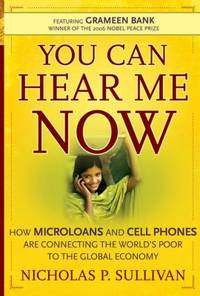
You Can Hear Me Now: How Microloans and Cell Phones Are Connecting the World's Poor to the Global Economy Hardcover - 2007 - 1st Edition
by Sullivan, Nicholas P
- Used
- Hardcover
Description
Details
- Title You Can Hear Me Now: How Microloans and Cell Phones Are Connecting the World's Poor to the Global Economy
- Author Sullivan, Nicholas P
- Binding Hardcover
- Edition number 1st
- Edition 1
- Condition New
- Pages 272
- Volumes 1
- Language ENG
- Publisher Jossey-Bass, New York
- Date 2007
- Illustrated Yes
- Features Bibliography, Dust Cover, Illustrated, Index, Price on Product - Canadian, Table of Contents
- Bookseller's Inventory # G0787986097I2N00
- ISBN 9780787986094 / 0787986097
- Weight 1.02 lbs (0.46 kg)
- Dimensions 9.35 x 6.29 x 1.08 in (23.75 x 15.98 x 2.74 cm)
- Library of Congress subjects Information technology - Developing countries, Telecommunication - Developing countries
- Library of Congress Catalog Number 2006032157
- Dewey Decimal Code 384.535
About ThriftBooks Washington, United States
From the largest selection of used titles, we put quality, affordable books into the hands of readers
Summary
From the publisher
From the jacket flap
--President Bill Clinton, Dhaka, Bangladesh, 2000
Bangladeshi villagers sharing cell phones helped build what is now a thriving company with more than $200 million in annual profits. But what is the lesson for the rest of the world? This is a question author Nicholas P. Sullivan addresses in his tale of a new kind of entrepreneur, Iqbal Quadir, the visionary and catalyst behind the creation of GrameenPhone in Bangladesh.
GrameenPhone--a partnership between Norway's Telenor and Grameen Bank, co-winner of the 2006 Nobel Peace Prize--defines a new approach to building business opportunities in the developing world. You Can Hear Me Now offers a compelling account of what Sullivan calls the "external combustion engine"--a combination of forces that is sparking economic growth and lifting people out of poverty in countries long dominated by aid-dependent governments. The "engine" comprises three forces: information technology, imported by native entrepreneurs trained in the West, backed by foreign investors.
GrameenPhone's successful effort to provide universal telephony in a country that had virtually no phones, using microloans generated by Muhammad Yunus, co-winner of the 2006 Nobel Peace Prize, confirms the power of bottom-up development, which is creating millions of income opportunities for the rural poor and billions of dollars in national income. With similar success stories in other poor countries--such as those of Celtel, MTN, and Vodacom in sub-Saharan Africa, and of Globe Telecom and Smart Communications in the Philippines--cell phones are spreading like wildfire across the Southern Hemisphere and are helping to bridge the digital divide. You Can Hear Me Now describes an inclusive capitalism that engages and enables many of the four billion people at the bottom of the economic pyramid.
Media reviews
Citations
- Library Journal, 02/01/2007, Page 83
